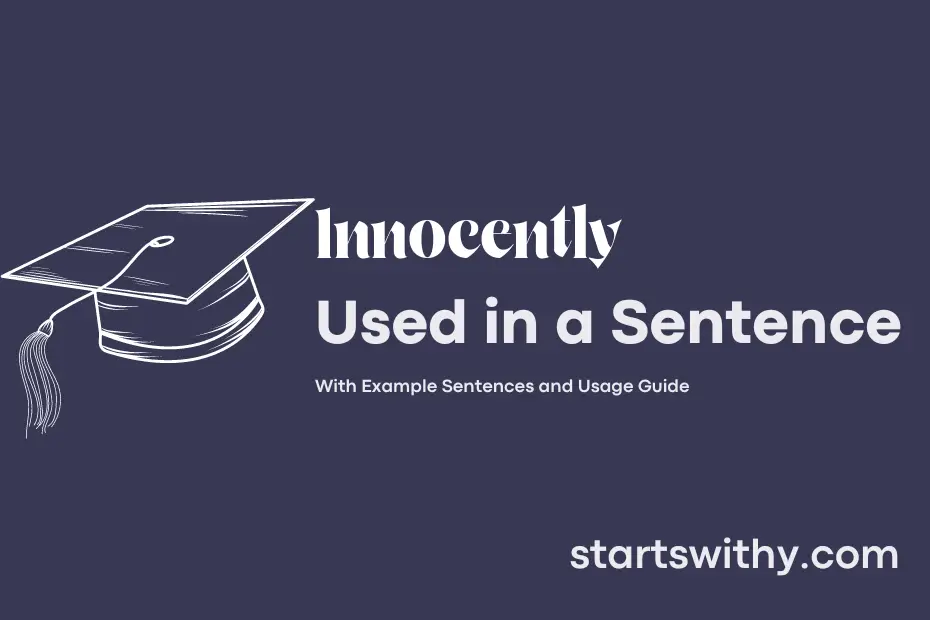Have you ever said or done something innocently, only to realize later that it was taken the wrong way? When a statement or action is innocent, it means that there was no intention to cause harm or offense.
In communication, misunderstanding can often arise when innocent words or gestures are misinterpreted. Clarity and context play a crucial role in ensuring that our innocent intentions are accurately conveyed and understood.
7 Examples Of Innocently Used In a Sentence For Kids
- Innocently, the little girl picked flowers in the garden.
- The puppy innocently wagged its tail at the children.
- She innocently asked her friend to share the toys.
- The butterfly innocently fluttered from flower to flower.
- The baby innocently giggled while playing with his toys.
- He innocently shared his snack with his friend.
- Innocently, the boy hugged his mother tightly.
14 Sentences with Innocently Examples
- Innocently, I asked the professor if we could have an extension on the assignment.
- I innocently left my textbook in the library, hoping no one would take it.
- He innocently mentioned that the deadline was approaching, unaware of the anxiety it caused the group.
- Innocently, she asked the question that stumped the entire class.
- The group members innocently believed they could finish the project in one night.
- He innocently wandered into the wrong classroom, causing confusion among the students.
- She innocently borrowed a pen from a classmate without realizing she never returned it.
- The student was caught innocently doodling in the margins of their notebook during the lecture.
- Innocently, he ate the last slice of pizza that was meant for the group project meeting.
- She innocently mentioned to the professor that the test date conflicted with another important exam.
- The students innocently believed that skipping class wouldn’t affect their grades.
- He innocently asked the dean for more funding for the student club, not knowing the implications it would have.
- Innocently, she signed up for six classes in one semester, unaware of the workload it would bring.
- The students innocently thought they could get away with plagiarism, not realizing the consequences.
How To Use Innocently in Sentences?
To use Innocently in a sentence, you can follow these simple steps:
-
Definition: Before using any word, it is important to understand its meaning. Innocently means to do something without any guilt or evil intentions, often in a naive or unsuspecting manner.
-
Placement: Innocently is an adverb, which means it is used to describe how an action is performed. It is placed before the verb in a sentence to modify the action.
-
Example Sentences:
- She innocently played with her toys, unaware of the chaos happening around her.
- He innocently asked why everyone was whispering, not realizing the gravity of the situation.
- The puppy looked up at us innocently, wagging its tail as if nothing had happened.
-
Punctuation: When using Innocently in a sentence, make sure to punctuate correctly. Commas can be used before or after innocently, depending on the flow of the sentence.
-
Practice: The best way to learn how to use innocently in a sentence is to practice. Try incorporating it into your writing or conversation to become more comfortable with its usage.
By following these steps and practicing using Innocently in different contexts, you will soon become adept at incorporating this word into your vocabulary effectively.
Conclusion
In conclusion, sentences that are innocently formulated may still convey a sense of naivety or lack of awareness. While these sentences may be free from malicious intent, they can sometimes unintentionally reveal ignorance or lack of understanding. It is important to consider the implications of our words and the potential interpretations they may carry, even if they are innocently meant.
Therefore, when crafting sentences, it is crucial to be mindful of the language used and the context in which they are shared to ensure that they effectively convey the intended message. Despite innocence, words hold power and can have varying impacts on the individuals receiving them. Being conscious of the way we communicate can help prevent misunderstandings and promote clearer and more effective interactions.



